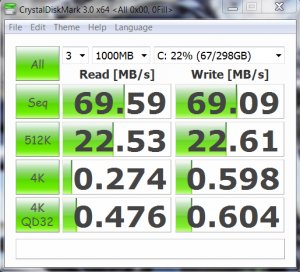CRYSTAL DISK BENCHMARK VER. 3.0 X64
Crystal Disk Benchmark expands on our ATTO benchmark testing by providing low 4k random performance. The two most effective measurements in determining the ‘visual upgrade’ we might see are 4k random performance scores as well as disk access times which will be seen later in the report. The HDD alone is shown on the left while the same HDD cached is on the right.
4K random results that don’t even reach 1MB/s are typical for a hard drive where as, with current SSDs, results if 65MB/s write performance are actually a bit low for today’s solid state drives. In fact, unless someone had mentioned that the result on the right was that of a cached HDD, there would be no way of telling it apart from a typical SSD result.
ANVIL STORAGE UTILITIES PROFESSIONAL
Over the last little while, we have been assisting with beta testing new benchmark software called Anvil Storage Utilities which is an absolutely amazing SSD benchmarking utility. Not only does it have a preset SSD benchmark, but also, it has included such things as endurance testing and threaded I/O read, write and mixed tests, all of which are very simple to understand and utilize in our benchmark testing.
HDD
The largest visual upgrade we will see when migrating from a hard drive to a solid state drive occurs through a significant reduction in disk access times and it is no different when we cache a hard drive with an SSD. A quick look at the access times above (Resp. Time) in comparison to the Cached HDD below will show a significant drop in the time it takes to retrieve information and this results in a much faster computer. This will become especially obvious when we see start times later in the report.
CACHED HDD
Once again a quick comparison between the cached hard drive above and the results of the SSD alone will demonstrate that NVELO Dataplex can speed the performance of a hard drive to that of a SSD. To verify the storage medium, simply look at the identification on the bottom right of each result.
SSD
 The SSD Review The Worlds Dedicated SSD Education and Review Resource |
The SSD Review The Worlds Dedicated SSD Education and Review Resource | 


I’m intrigued. Migration is much easier than transferring OS and programs to a boot SSD drive, but I wonder what happens when things go wrong. The system crashes, power is interrupted at an inconvenient time, etc. Will a cache recover as gracefully as a dedicated SSD boot drive?
I thought I might test your theory and crashed my system in the middle of working as Dataplex is still installed. On reboot, it took a few seconds to validate the cache and all was back to normal. Unfortunately, I couldnt take a screen shot to display the procedure.
Thanks for the quick input. This may be the way to go. Not quite the performance of a boot drive, but ample for the kind of work I do … photo editing, etc.
Stop spreading those “observe, use timer stuff” for boot time. Use the event viewer id 100 for boot time. It’ll tell in extreme precision aka milli seconds
Understand your point, however, we like to keep our reviews very easy to understand and feel that the software use has ideal results and presentation for our reviews.
Thanks for the comment!
Hehe, softwares actually use the event viewer’s information. I know there is a program called bootracer. It uses event viewer. What else? Oh there is windows performance tool. It uses event viewer too.
What I want to tell is don’t be using timers to measure boot and shutdown time. Just in case if you don’t know, take your time and have a look.
https://www.techrepublic.com/blog/window-on-windows/use-windows-7-event-viewer-to-track-down-issues-that-cause-slower-boot-times/3253
Sure you didn’t mean to say that the software uses the same performace counters that are used by Event Viewer?
Les, do you think that the 30gb give near the same performance?
What would you chose between the Crucial Adrenaline running in SATA 2 and this one (60gb version)?
The Crucial Adrenaline is fully compatible in SATA 2 and both perform to their specs regardless of their size; the difference would be lifespan of the SSD which is still a very long time.
Still using the Accelerator in my system as I did the Adrenaline…both great caching solutions.
these look great but i wish they came in 128GB for longevity (less writes) and general purpose reasons, for me which is gaming… A few modern day mmos and FPS games would probably eat up 64GB fast
OCZ Synapse PricesType your reply…
Hi Les, just curious, would using a really fast SSD (e.g Intel 520 or something equivalent) and then using the corsair accelerator as a caching solution, drop your boot times further?
No that would not occur. The SSD alone will always be faster but we are talking seconds. The fastest full boot I have ever reached was 7 seconds whereas any NVELO caching solution can get to 14 seconds. IMHO, it would not be a financial viable alternative just to grab back those very few seconds.
AS well, the caching solution alone is not available as its own entity and all instances of caching sales have that software tied into the specific SSD so you could not simply exchange the SSD.
Thanks for the reply Les. Wow! A 7 sec boot! That’s pretty amazing. Was it from the time you switched the computer on to usability? What config were you using for that 7 sec boot?
Can still be done and it is from the press of the button to desktop usability. Many of done well with our Optimization Guide but, to reach this, maximum optimization is necessary.